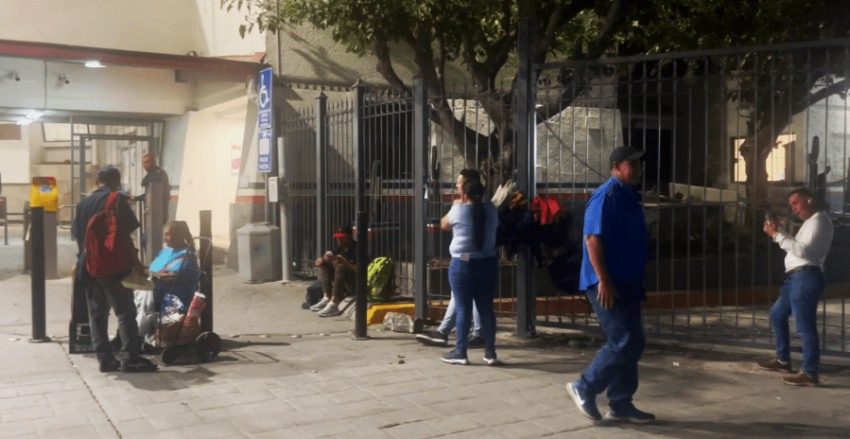EL PASO, Texas (Border Report) – The El Paso region topped the nation in migrant encounters in fiscal year 2023 as it dealt with continuous mass arrivals of Venezuelan nationals, U.S. Customs and Border Protection data shows.
Such surges documented in January, May, July and September stretched thin local governments and nonprofits that provide humanitarian assistance to asylum-seekers and filled processing centers to historical highs. At one point, Mayor Oscar Leeser said the city was on the brink of “a breaking point,” and voted with the City Council to purchase a vacant school for use as a migrant shelter.
The U.S. Border Patrol’s El Paso Sector, which includes the state of New Mexico, recorded 427,471 illegal entries between ports of entry between Oct. 1, 2022, and Sept. 30, 2023. Border agents apprehended a total of 38,148 migrants last month alone – an average of 1,271 a day – and CBP had more than 7,500 individuals and families at processing centers in the region in late September, according to the City of El Paso’s migrant dashboard.
But the same sources this Monday were reporting a drastic drop in apprehensions and migrants in custody in the region. Migrant encounters are down to 516 a day and 1,056 were in CBP custody, the dashboard showed.
El Paso County Judge Ricardo Samaniego said he conferred with Homeland Security Department Chief of Staff Kristie Canegallo and attributes mid-October’s sudden drop to two factors.
“A lot of the reasons our numbers went down was (because) the biggest challenge we had was Venezuela. For (DHS) to repatriate and begin to take them back to their country is probably the most significant change,” Samaniego told Border Report on Monday. “The other change that has brought the numbers down is working better with Mexico as (they) try to protect their borders as well.”
DHS told Samaniego that “the numbers are down” and that the agency doesn’t expect them to go up again for the moment. Agency officials also attributed that to the repatriation flights that were announced on Oct. 5 and began last week.
“I don’t like the fact that they’re being sent to a place where they are running away from, but that serves as a deterrent and helps us organize ourselves better,” Samaniego said. “Most of them don’t live in Venezuela anymore. They live in Colombia, they’re living all over.”
Across the border in Juarez, Mexican officials say they, too, have noticed a decrease in the arrival of foreign nationals, particularly those who come to the border atop cargo trains.
Border Report this past weekend toured migrant concentration points in South El Paso and northern Juarez. Only pockets of released migrants could be seen around El Paso’s Sacred Heart Church and those spending the night near Juarez’s Paso del Norte international bridge said they had pending appointments with CBP.
“We spent one month getting the (online) appointment, and thank God, we got it,” said Ricardo, a Venezuelan migrant preparing to spend the night with his family at the foot of the bridge.
Ricardo said he fled Venezuela because of rising food prices and threats from criminal gangs.
“I had a small business. I sold many things. But if we didn’t pay up (extorsion money to criminals), the consequences are bad,” he said. “Here (in Mexico), there is no work, the rents are high. Sometimes we paid for a room for the night, and it was already crowded. But God gave us the opportunity to be here tonight, and, in a few hours, we will cross” into the United States.
Three Venezuelan women and their children prepare to spend the night on the streets of Juarez in anticipation of their asylum appointment with CBP the next morning.
Walter, another former store owner, and his wife Susana, a kindergarten teacher, were already in line at the foot of the bridge around 10 p.m. Their CBP appointment was at 6 a.m.
“You never know if they will call you earlier, or if too many people get in front of you and they (limit) how many can go up” the bridge, Walter said. He said fear of falling prey to criminals – especially that something might happen to his wife – prompted the couple to stay in Mexico City for several weeks while they waited for their online appointment to start the asylum process in America.
Susana said waiting to cross into the U.S. in a lawful manner was worth the wait and expenses in Mexico. The couple flew into Juarez, rather than expose themselves to kidnapping or mishaps on Mexican roads.
“The trip to Mexico was not easy. It was getting off and on vans constantly. We had to stand in line many hours to get our (humanitarian visa) in Mexico, but we did it,” Susana said. “We don’t know what awaits us, but we are confident that things are going to go well.”
The couple is headed to Houston, provided they pass their screening by CBP.
Read: Read More




